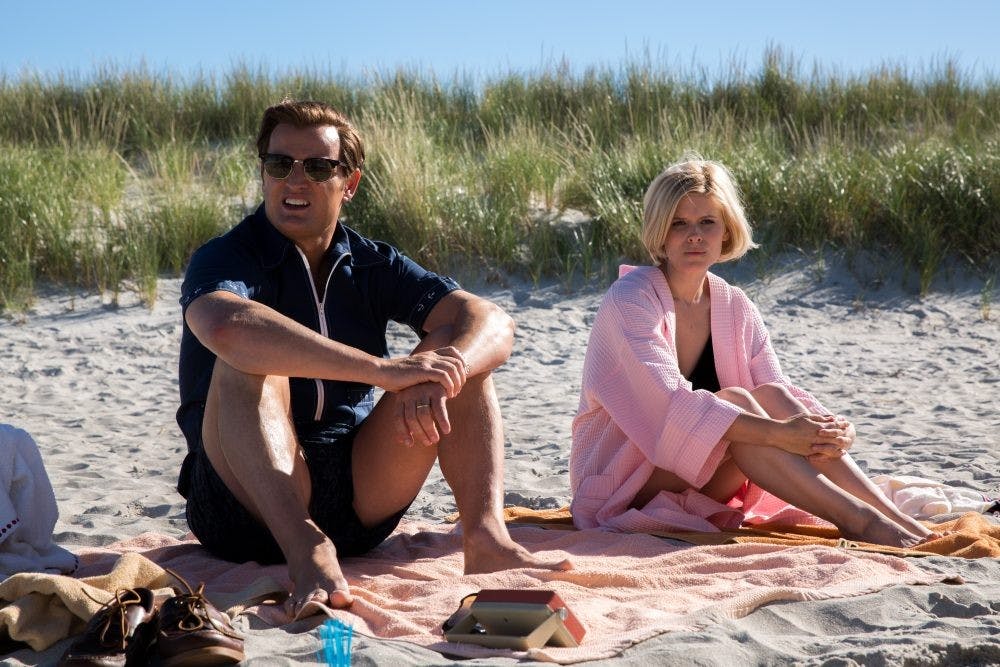“Chappaquiddick” shows what happens when the powerful get away with murder

Throughout the 20th century, America’s royal family, the Kennedy’s, could never seem to escape tragedy. Joseph Jr. died in World War II. Rosemary was lobotomized. JFK was assassinated in 1963, followed by his younger brother, Bobby, five years later. JFK Jr. and “Kick” both died in plane crashes 51 years apart. In the summer of 1969, Ted, the last living Kennedy son, destroyed any chance he had of becoming president by fleeing the scene of a fatal accident and failing to notify the police. Nearly half a century later, “Chappaquiddick,” as written by Taylor Allen and Andrew Logan, dramatizes what happened that July night and in the week that followed. During those seven days, Ted Kennedy continually prioritized his reputation and legacy over the truth of his involuntary manslaughter of his 28-year-old passenger.
Friday, July 18, 1969. Chappaquiddick Island, Massachusetts. Senator Ted Kennedy hosts a reunion party for the Boiler Room Girls, six young women who worked on his deceased brother Bobby Kennedy’s 1968 presidential campaign. A year has passed since Bobby’s assassination, and Ted and the girls, particularly Mary Jo Kopechne, still feel the stinging pain of loss. During the party, Mary Jo and Ted go for a drive in Ted’s 1967 Oldsmobile, which ends up flipped inside of Poucha Pond after Ted (who is possibly inebriated) drives off Dike Bridge. Ted escapes but can’t get Mary Jo out. Assuming she has drowned, he immediately asks his allies to help him cover up his crime so his political career won’t suffer. When fishermen discover the submerged vehicle and divers recover Mary Jo’s body, Ted goes to increasingly desperate lengths to paint himself positively while wondering if he’s only chasing the presidency because of the weight of his family name.

Jason Clarke uses his criminally underrated acting chops to emphasize Ted Kennedy’s deeply flawed personality whilst ensuring the viewer somewhat understands the senator’s inner struggles. The runt of the four Kennedy sons, Ted lives every day in their shadow. He wants to be his own man, but can’t escape his family’s chokehold.
Kate Mara has little screen time as the doomed Mary Jo but in those scenes she depicts the wholesome young woman as an idealist who tries to hold onto her integrity in a turbulent time. The film’s hardest-to-watch scene is when Mary Jo is trapped in the car, fueled by the sharp realism Mara brings to it. Realizing she’s on the brink of death, Mary Jo prays the Hail Mary, her hard sobs making the words hard to decipher.
Meanwhile, Ed Helms leaves his “Hangover” past in the rearview mirror as Joe Gargan, Ted’s cousin and lawyer. As one of the few people who knows the full truth early on, Gargan finds himself painfully stuck between not wanting Ted to be destroyed by his own stupidity and anguishing over the fact that said stupidity also cost a woman her life. Many of Helms’ best moments come when he has to nonverbally react to the dialogue or actions of others, such as the close-ups of his distressed face as Ted reads a scripted televised statement. Finally, Bruce Dern drives home the mow-you-down ambition of Joseph Kennedy Sr., the Kennedy patriarch, with one repeated word----“Alibi!”
During an official investigation into the accident, John Farrar, the diver who extracted Mary Jo’s body from the car, said, “I could have had her out of that car 25 minutes after I got the call. But he didn’t call.” Investigators later found that Mary Jo’s death wasn’t quick. Instead she suffocated when her small air pocket ran out of breathable oxygen two to four hours after the accident. In spite of Ted Kennedy’s reprehensible actions, the people of Massachusetts and America largely forgave him, voting him back into public office. When he died in 2009, Ted Kennedy was the fourth-longest serving senator in United States history. Anyone else’s political aspirations would have ended 40 years earlier, on that summer night in July 1969.
Rating: 5/5 stars
More from The Rice Thresher

ktru’s annual Outdoor Show moves indoors, still thrills
ktru’s 33rd annual “Outdoor Show” music festival shifted indoors March 29 due to concerns about inclement weather. Despite the last-minute location change, attendees, performers and organizers said the event retained its lively atmosphere and community spirit.

Rice’s newest sculpture encourages unconventional ‘repair’
A white-tiled geometric sculpture sits on the outer corner of the academic quad, between Lovett and Herzstein Halls. A variety of materials – string, pins, ribbon – are housed on the structure in plastic containers.

Review: ‘Invincible’ Season 3 contemplates the weight of heroism
When I think of "Invincible," I immediately picture Mark Grayson at the emotional center of his universe, much like Spider-Man anchors the Marvel world. Mark is a hero deeply shaped by tragedy, yet driven by a seemingly impossible desire to remain good. Despite pure intentions, his efforts often backfire spectacularly. And ultimately, despite his reluctance, he faces uncomfortable truths about what it genuinely means to be heroic.

Please note All comments are eligible for publication by The Rice Thresher.